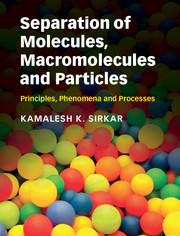Description
Separation of Molecules, Macromolecules and Particles
Principles, Phenomena and Processes
Cambridge Series in Chemical Engineering Series
Author: Sirkar Kamalesh K.
A modern separation process textbook written for advanced undergraduate and graduate level courses in chemical engineering.
Language: English
Subjects for Separation of Molecules, Macromolecules and Particles:
Approximative price 90.79 €
In Print (Delivery period: 14 days).
Add to cart
Publication date: 01-2014
909 p. · 19.2x25.2 cm · Hardback
909 p. · 19.2x25.2 cm · Hardback
Description
/li>Contents
/li>Biography
/li>
Providing chemical engineering undergraduate and graduate students with a basic understanding of how separation of a mixture of molecules, macromolecules or particles is achieved, this textbook is a comprehensive introduction to the engineering science of separation. ? Students learn how to apply their knowledge to determine the separation achieved in a given device or process ? Real-world examples are taken from biotechnology, chemical, food, petrochemical, pharmaceutical and pollution control industries ? Worked examples, elementary separator designs and chapter-end problems are provided, giving students a practical understanding of separation. The textbook systematically develops different separation processes by considering the forces causing the separation and how this separation is influenced by the patterns of bulk flow in the separation device. Readers will be able to take this knowledge and apply it to their own future studies and research in separation and purification. Online resources include solutions to the exercises and guidance for computer simulations.
Introduction; 1. Description of separation in a closed system; 2. Description of separation in open separators; 3. Physicochemical basis for separation; 4. Separation in a closed vessel; 5. Effect of chemical reaction on separation; 6. Open separators: bulk flow parallel to force and continuous stirred tank separators; 7. Separation in bulk flow of feed-containing phase perpendicular to the direction of the force; 8. Bulk flow of two phases/regions perpendicular to the direction(s) of the force(s); 9. Cascades; 10. Energy required for separation; 11. Common separation sequences.
Kamalesh K. Sirkar is a Distinguished Professor of Chemical Engineering and the Foundation Professor of Membrane Separations at New Jersey Institute of Technology (NJIT). His research areas are membranes and novel membrane-based processes. He is the Editor-in-Chief of Current Opinion in Chemical Engineering. Professor Sirkar has received multiple awards, including the 2009 NJIT Overseer's Excellence-in-Research Medal and has authored or co-authored 160 refereed journal articles, 19 book chapters and 27 US Patents. His co-edited book, Membrane Handbook, won the Professional Scholarly Publishing Award for the Most Outstanding Engineering Work in 1992.
© 2024 LAVOISIER S.A.S.




